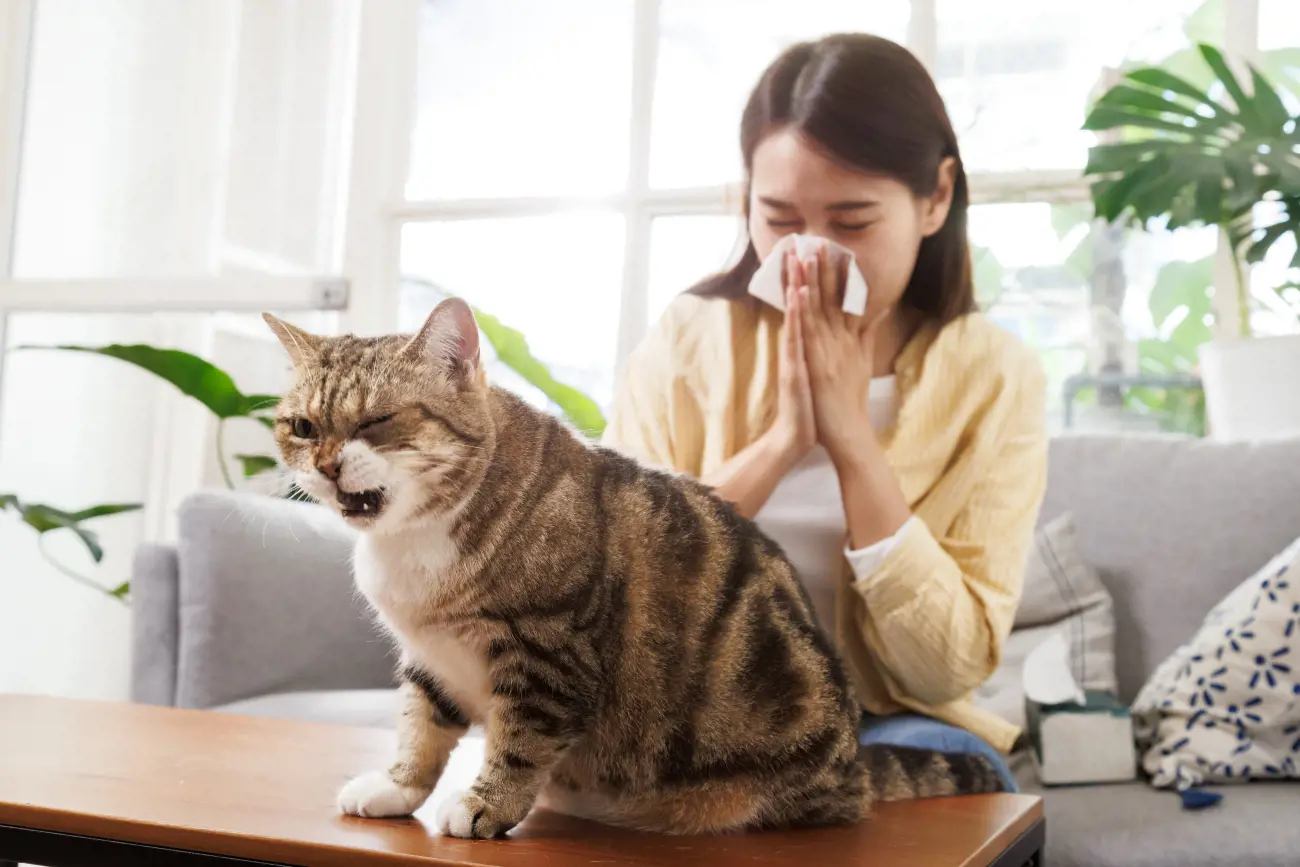How do I get rid of that cat pee smell?
9th February, 2021

If your home starts to develop a distinct cat pee whiff, it’s best to take action.
Firstly, you need to investigate why your puss has started peeing or spraying indoors. Secondly, you’re going to need some serious cleaning know-how to tackle the pong while you work out what the underlying issue is.
If it’s a health issue, cat insurance could help cover the costs of any unexpected vet bills.
Why do cats pee in the wrong place?
For cats, peeing can serve two purposes. They need to pass waste water to stay healthy, just like humans, but cats also sometimes use urine to mark their territory.
You can tell which your puss is doing by observing them – a cat will squat to urinate on a horizontal surface, but rear up and squirt urine on a vertical surface when they are spraying to spread their scent.
Both males and females are capable of spraying in this way.
The issue with your cat could be a medical problem, related to stress or anxiety, or it might be part of mating behaviour.
It’s not pleasant for you as a cat owner to clean up urine and faeces from around your house, but it’s important not to take your annoyance out on your pet by scolding or punishing them.
If anything, this could add to an animal’s stress and make the problem worse.

Cats are typically very clean animals who prefer to use a litter tray or do their business outdoors. There are a number of possible causes for a sudden change in toileting habits.
Health issues
Ruling out a health problem should be at the top of your list. Take your cat to the vet for a check-up.
Urinary tract infections and cystitis are common problems that cause cats to leak urine frequently. As well as issues with urination, you might notice your cat showing signs of being in discomfort, trying to urinate frequently and licking their genitals a lot.
Sometimes cats also change their eating and drinking habits, become lethargic or hide away from you.
More serious problems that cause urination include tumours, bladder stones, bladder blockages, and injuries to the spine or abdomen. It’s best to get your cat checked to rule out a medical issue.
If your feline is unable to urinate or has a swollen, tender tummy you should seek urgent help from your vet. This type of emergency care may be covered under your cat insurance policy.
Stress and anxiety
When cats feel vulnerable or afraid, they sometimes urinate or defecate to mark out their territory in a defensive way.
If your cat starts to urinate around the house, consider whether something might be stressing them out. Is there a new pet, a new baby or some other unpredictable activity in the home?
Cats are very sensitive to change, and may react to even minor changes in the home such as moving furniture around, building work nearby, redecoration or a strange cat moving into a neighbouring property.
Another common trigger is if you go away for an extended period, leaving them in a boarding house or with another caregiver.
With many stress factors, your cat will adapt to the change and become less stressed in time. However, if the problem continues then you may wish to address the issue, for example by providing extra quiet places for your pet to retreat, giving them extra reassurance or using an anti-anxiety medication.
Cat medication can be costly – make sure you protect yourself against unexpected costs by taking out the right insurance for your cat.
Changes to the litter tray
You should always provide a litter tray for your cat, even if they generally prefer to toilet outside. You never know when your cat might prefer to stay indoors because of a change in weather, a new cat arriving in the neighbourhood or some other factor.
Cats can be quite particular about their litter tray. It’s worth thinking through whether something might have changed or whether you could make a change to encourage your cat to toilet in the tray rather than around the house.
Things that might put a cat off a litter tray include it not being emptied frequently enough, being emptied too often, especially if scented cleaning products are used, or changing the brand of litter (slowly mix in a new brand to make a gradual change).
Your pet might also be put off the litter tray if they develop a negative association with it. It could be that they had an unpleasant experience with another pet or a child close to the tray, or that the tray is in an exposed spot that does not feel secure enough for the cat to relax.
The tray should be away from the cat’s food and water bowls, and somewhere private away from disturbances such as washing machines, children and busy areas.
Other factors
Spraying is often a normal part of mating behaviour. If you are not planning to breed from your cat, a simple solution is to have your pet spayed or neutered as soon as possible. The longer you allow an unneutered cat to spray, the harder it will be to break the habit.
Cats also often urinate indoors as they get older. This could be due to a physical problem such as osteoarthritis, or mental deterioration. Check with your vet to find ways to manage these problems.
How to clean up cat pee
Cleaning up cat pee quickly and effectively will not only cut down on smells – if you allow cat pee to linger then it could entrench the behaviour by making your cat associate certain areas of the house with urine or faeces.
As the scent begins to fade, your cat might think it’s time to revisit the site and leave another gift! Removing the smell through cleaning can help stop this cycle.
To begin, blot up as much of the fluid as you can with paper towels, then spray with a mild cleaning solution (a little biological washing powder mixed with water, a washing-up liquid solution or upholstery cleaner).
Wipe with plain water then add a few drops of disinfectant to tackle any lingering smell.

If your cat pees on washable fabrics, soak overnight with bio washing powder then machine wash. Non-washable fabrics can be cleaned using a vinegar solution or through professional dry cleaning. If your cat pees on a hard wooden surface, use white vinegar with a few drops of clean-smelling essential oil.
Stale cat wee is tough to clear, as the acid crystals in the urine bond to surfaces and are hard to clean off. Use a special enzyme-based cleaner designed for pet urine to tackle this.
Do you need quality cat insurance you can rely on? Get a quote from Purely Pets today.
Policy benefits, features and discounts offered may very between insurance schemes or cover selected and are subject to underwriting criteria. Information contained within this article is accurate at the time of publishing but may be subject to change.
Helpful Pages
Recent Posts

Why do Great Danes bury their heads?
12/03/25
Find out more about Beagles
28/02/25Pet Insurance Quote
- 98% claims paid *
- Claims paid directly to vets
- 24/7 vet video consultations
- Interest free monthly payments


